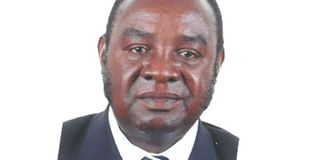Spelling names wrongly is demeaning, offensive to the owners

Charles H.T.A Akora
What you need to know:
- This is a common and an unfortunate face of journalism in Uganda where reporters and their editors just write the spelling of names of people and places in the way their tribal dialects pronounce the letters or words of the names and places they are writing about without any concern about the feelings of the individuals or the people living in the areas they are writing about, or even attempting to find correct spellings.
Allow me to submit this rejoinder to Mr Bernard Tabaire’s article: A government that can’t spell right can’t possibly govern right (Sunday Monitor February 12).
So journalists also get angry and cry when their names are spelt incorrectly! Then what do they think about the reactions of their defenceless victims whose names are misspelt from time to time? This is a common and an unfortunate face of journalism in Uganda where reporters and their editors just write the spelling of names of people and places in the way their tribal dialects pronounce the letters or words of the names and places they are writing about without any concern about the feelings of the individuals or the people living in the areas they are writing about, or even attempting to find correct spellings.
A few examples will illustrate my frustration and dilemma with the Uganda media in this respect.
Sometime back, a columnist in one of his regular contributions in “The EastAfrican” could not make the difference in spelling the name of Ms Draru (the woman convicted and currently jailed in Luzira prison for the murder of Gen Kazini) and Charles Dralu, a onetime Ugandan sprint champion in athletics whose name he misspelt as Draru (a woman’s name). In many Bantu languages there is a problem of pronunciation distinction between the letter L and R. There is apparently no difference between these two letters to them. The rest of us non-Bantu do not have that problem: The two letters are separate and distinct. So media gurus please pay attention to this. Kindly write as spelt, not as pronounced. Ask for the spelling if in doubt.
The infamous rebel leader Joseph Kony is generally mispronounced as Joseph Kon’i. Why do we not then pronounce the word Nyabo as Niabo? or the name Nyombi as Niombi?
The ethnic group called Lango. Quite often one person from Lango is being referred to as a Langi. This is wrong, that person (singular) is a Lango, the plural of then is Langi. Calling one person a Langi is disrespectful and offensive to the community. This is similar to calling one Muganda a Baganda Similarly, the language is Lango or Leb- Lango ( not Langi).
Recently, in a supplement in the New Vision announcing the official launch of the Lira Zonal office of the Ministry of Lands, Housing and Urban Development, a Lango lady I know by the name Mildred Rose Amucu had her name misspelt as “Amukyu” (Page 2 of the supplement). This is a Kigandanised version of the spelling and pronunciation of the name, and is completely un-known in Lango.
This means that for me who is also called by the English name Charles should now be spelling the name as “Kyharles”!
This practice has gone on now for such a long time that Uganda media personnel are not bothered or concerned but instead believe there is nothing wrong, otherwise attempts would have been made at rectifying it.
Wrongly spelt or pronounced name particularly by the media is demeaning and offensive to the owner(s). How, for example, did Ms Amucu feel? This was callous.
To me this practice by journalists reflect a “boda-boda” rider’s mentality.
These motor cycle riders have been allowed to break every conceivable traffic regulation in the country with impunity for such a long time and they have reached a degree of self-confidence where they now believe that they are right and the traffic regulations are simply irrelevant. Any attempts by the authority to try to enforce these regulations are always resisted en-masse by them to the inconvenience of other road users. Ugandan media personnel are adopting this unfortunate culture and attitude despite the expensive training they go through. Misspelling names appears to be “business as usual”. I am glad that this has been brought out by Mr Tabaire, himself a media trainer who is very concerned about high media standards in Africa.
It is probably opportune that I also bring out another related problem here. The issue of the “Bantunisation” of the civil service and other formal establishments. It is now an unfortunate practice that in every office (government or otherwise) one goes, the language spoken is either Luganda or Runyakitara. What has happened to English which is supposed to be the official language of communication in these establishments? Even in the forces (especially the police), Kiswahili has been replaced by these two tribal languages, talk about East African integration.
Without being sectarian, let me put it down here that the rest of the non-Bantu speaking population of Uganda feel side-lined and alienated. I hope the head of Civil Service is paying attention to this almost inaudible whimper, otherwise the voice of patronage and tribalism comes out loud and clear.
Mr Charles H.T.A. Akora is a senior citizen and retired senior economist in the defunct East African Community.
Ps. Would you prefer that I spell my name as “ Kyharles H.T.A. Akola”?




